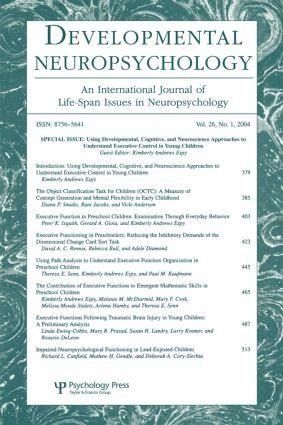
Using Developmental, Cognitive, and Neuroscience Approaches To Understand Executive Control in Young Children
A Special Issue of developmental Neuropsychology
Herausgeber: Espy, Kimberly Andrew
Versandkostenfrei!
Versandfertig in 1-2 Wochen
50,99 €
inkl. MwSt.
Weitere Ausgaben:

PAYBACK Punkte
25 °P sammeln!
The seven articles in this special issue represent a sampling of the exciting findings that are beginning to emerge from studies of executive control in young children. They demonstrate the multidisciplinary approaches to study cognition in young children that include application of cognitive, neuroscience, and developmental paradigms in typically developing youngsters, as well as those affected by clinical conditions, such as traumatic brain injury, exposure to low levels of lead in the environment, and prematurity. Although much work remains to be done, these study results are illustrative o...
The seven articles in this special issue represent a sampling of the exciting findings that are beginning to emerge from studies of executive control in young children. They demonstrate the multidisciplinary approaches to study cognition in young children that include application of cognitive, neuroscience, and developmental paradigms in typically developing youngsters, as well as those affected by clinical conditions, such as traumatic brain injury, exposure to low levels of lead in the environment, and prematurity. Although much work remains to be done, these study results are illustrative of the dynamic work in this exciting development period.














